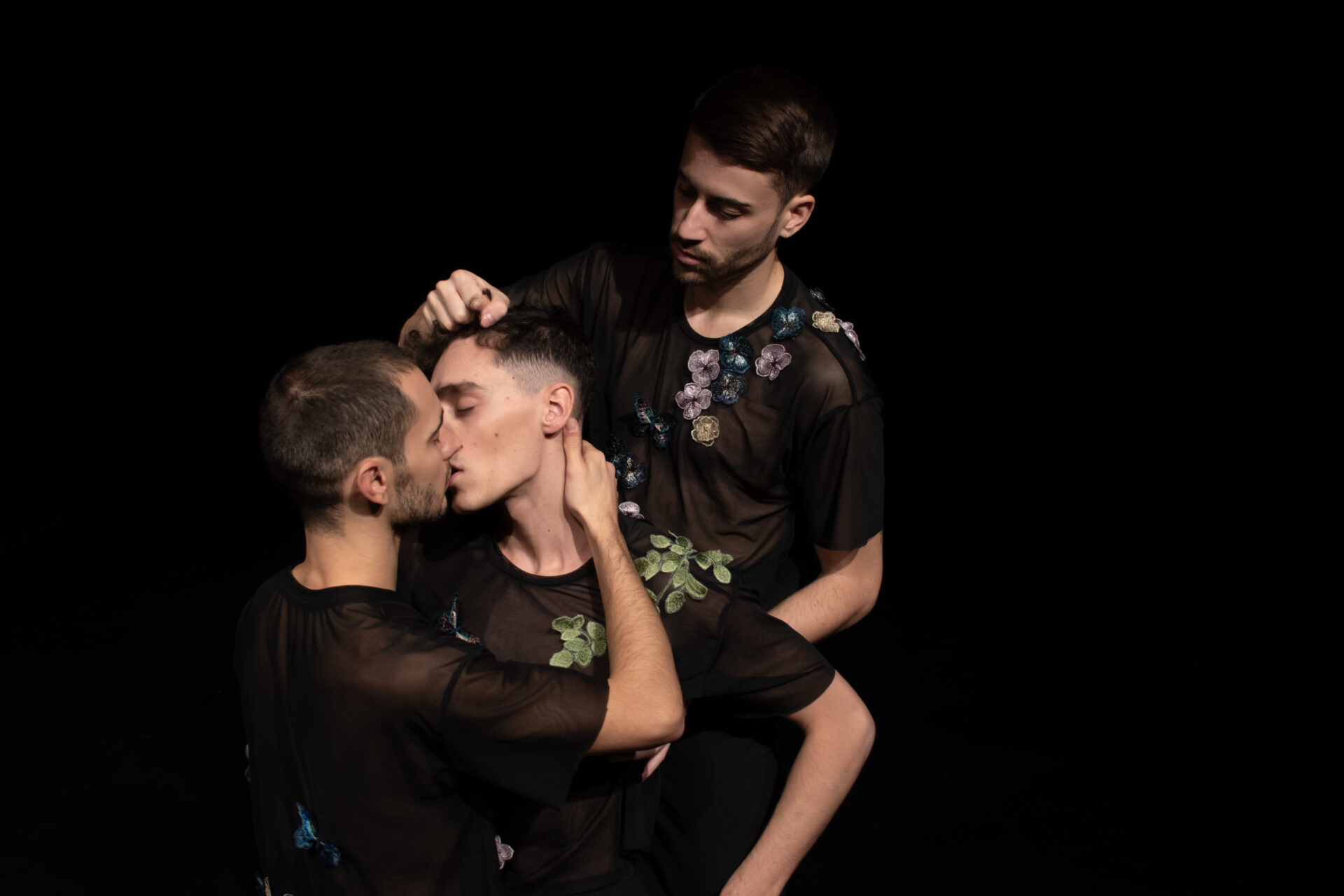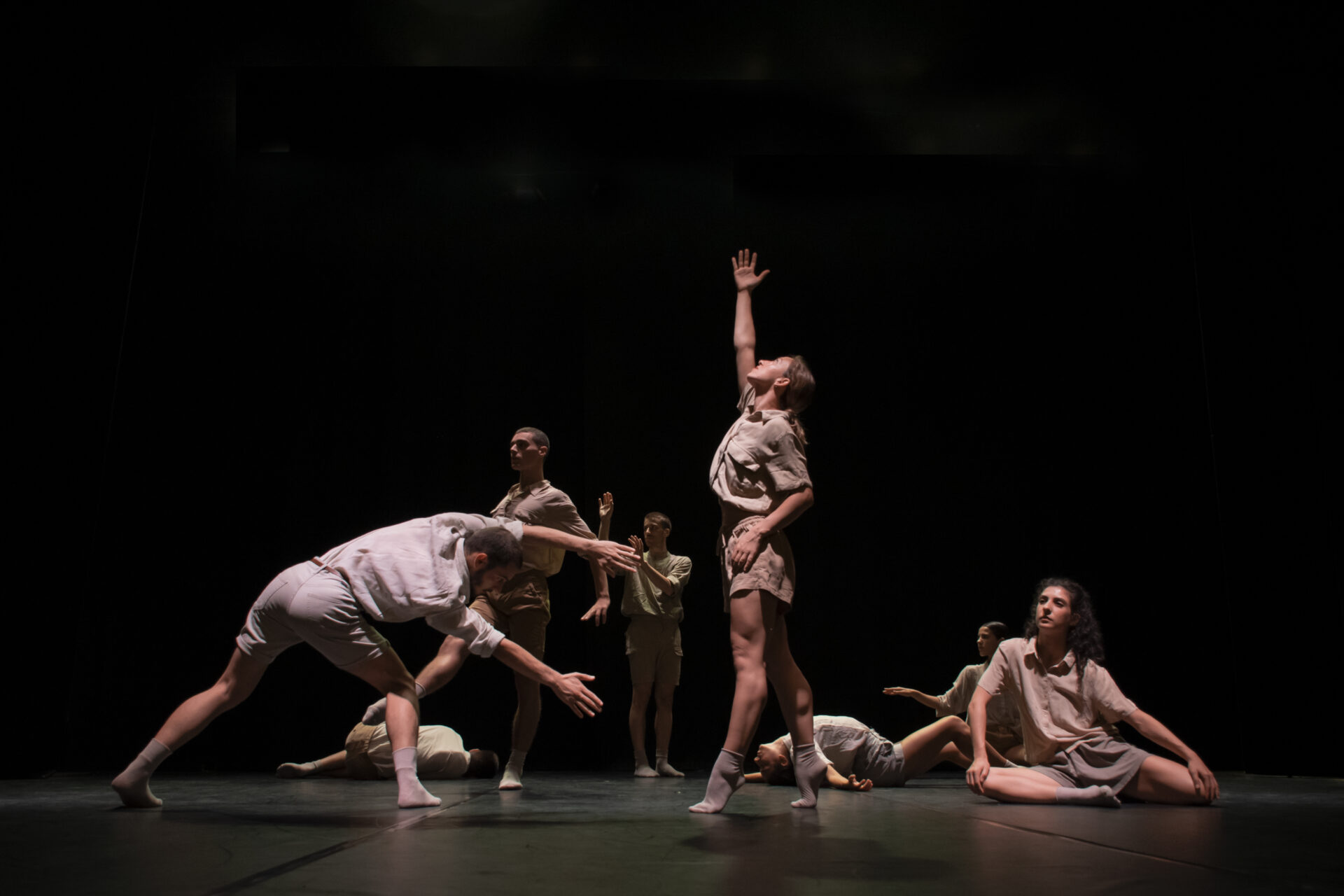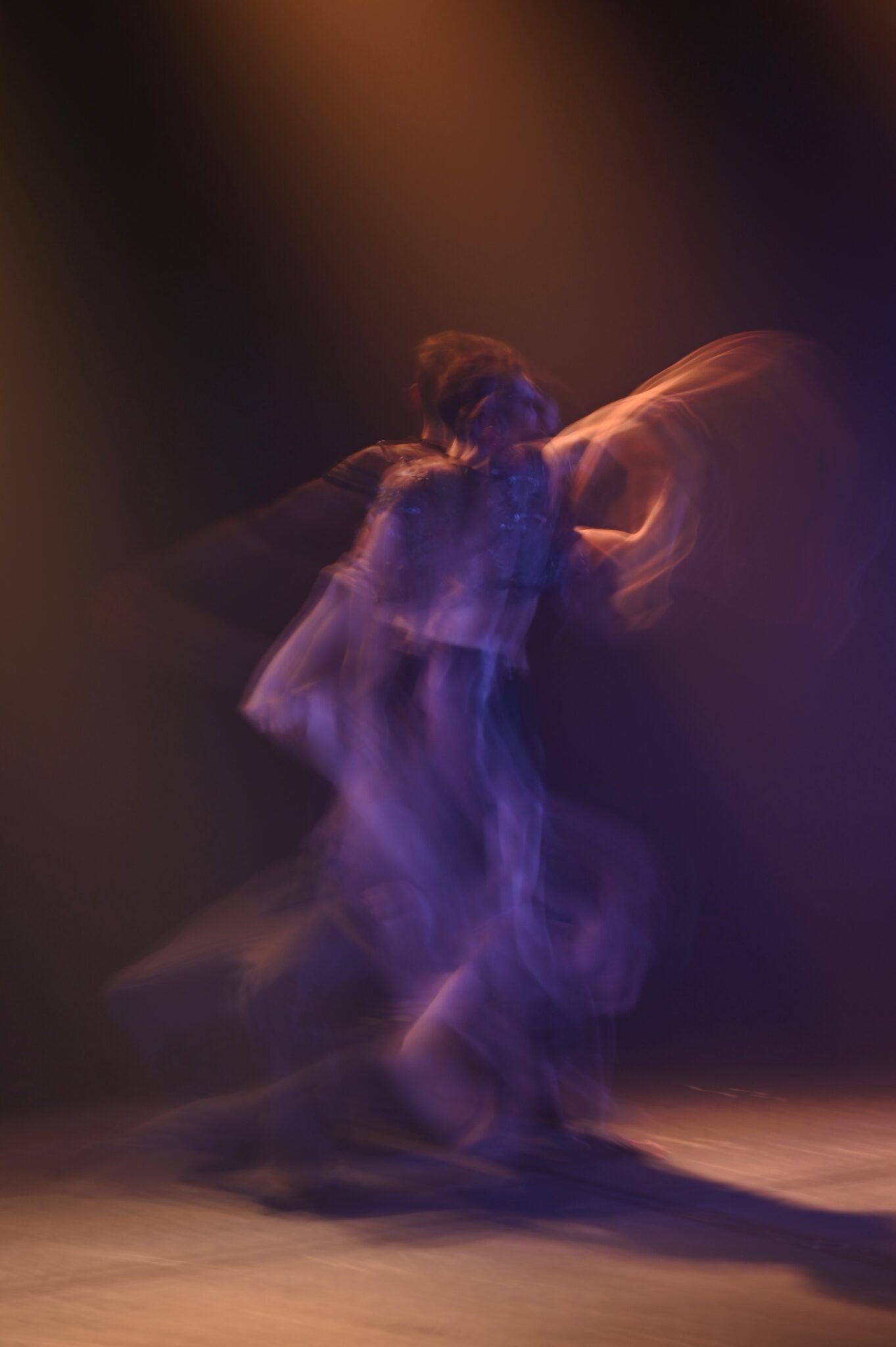

A LOT OF
In constant search. The need for the other. Avidity for contact, scents, and flavors. Freed from the inhibitory brake of modesty and social conventions, what could happen? Are we all animals? How much can we desire those around us? How much and how many can we love? Two bodies, then one, and suddenly three. Unexpected events and probabilities. Rhythms and rituals that beat, intertwine, and distort. The unnatural grace of Nijinski. The predatory instinct belongs to the human DNA. Marking territory becomes a game, imagining becomes a necessity. How much space do we have in our body, in our mind, and in our soul? How much can we host within ourselves? Hunger.
The number 3 is a constant in the work: 3 performers on stage, 3 different authors, 3 musical compositions, 3 historical characters, 3 parts.
The first of the three parts is a duet inspired by L’Après-midi d’un Faune, choreographed by Nijinsky in 1912. In the original work, the author addresses the theme of uncontrollable sexual impulse, which gives rise to a huge sense of guilt. In his Diaries, written seven years after the ballet, it is evident that the choreographer was inspired by his own life with Dyagilev, whom he was in love with. From this arises his inner contrast, due on one hand to the moral censorship of the times and on the other to the strong attraction to the prostitutes he frequented.
The second part is a solo built on the constant and repeated search for virility and eroticism already unwittingly inherent in popular memory. A plunge into sacrifice, a ritual aimed at a higher pleasure. Carnal movements that clash with the most sensual delicacies. A body that observes and scrutinizes. A body that screams and savors. A body that nestles on familiar melodies sinking into ancestral memories.
The third part tells an ancient love story by origin, contemporary by definition. On stage, two bodies that love each other until a third takes the place of one of the two, a new couple is formed but briefly, they become a trio; the triangle composed of the legendary Vaslav Nijinsky, Countess Romola de Pulszky, and impresario Sergei Pavlovich Dyagilev takes shape on stage through tenderness, passion, voyeurism, fun, anger, and loneliness. Romola’s strength, Nijinsky’s will, Dyagilev’s fury intertwine in forms, trajectories, patterns, explosions. Three people who love each other. Is this also love? What moves their souls and their bodies?
The music starts from the reworking of two immortal works: L’Après-midi d’un Faune by Debussy and Le Sacre du Printemps by Stravinsky. The themes are re-elaborated and deconstructed with an electro-acoustic approach, the harmonic material reiterated in an almost cathartic manner in order to underline the erotic and mad nuances of Nijinsky’s tormented poetry. Musical repetition is a fundamental part of the process, the matrix of a primitive feeling refined into modern man, a victim of love and its consequences.

SEHNSUCHT
Sehnsucht is a key word of the German romantic spirit, embodying a typical concept of romantic culture, rendered in Italian as “longing dependence”. Heidegger, on the other hand, identifies a different meaning, as Sucht is to be understood in its original sense as “pain”: “Nostalgia is the pain of the nearness of the distant”.
Sehnsucht means desiring to reach the limit that separates it from the next, to discover it, to show it, to touch it. Bodies alone but dependent, investigating, in a common space, their limits in relation to the body, space, time, and the other. The dancers enter into a system of movement where each element outlines the coordinates of choreographic scores characterized by unusual directions, accelerations, suspensions, falls, balances, and interruptions of dynamics.
The music, specially composed for the performance by Filippo Ripamonti, plays a role in defining the space created by the dancers, also through the use of reverbs and source tracking. The music expands until it breaks these boundaries with an anthropomorphic music, no longer tied to the distance between molecules but to the distance between people.
The creation seeks to go beyond the choreographic container itself, in an instantaneous composition, different with each repetition. The dancers enter into a score of spatial and temporal coordinates, with a vocabulary of movement to draw from each time to write a new relationship, a new choreography, in search of contact with the other, of reconciliation, of unity.
The choreographic flow in which the performers immerse themselves evolves and slowly reveals the internal relationships, questioning the limit, which forces them to constant attention to the group, to change, to instant reaction.
In this system, bodies seek each other, find each other, and explore contact anew, a new way of living the relationship in which the audience recognizes itself, living with hope and craving the performative act.
A LOT OF
by Nicolò Abbattista and Christian Consalvo
music by Filippo Ripamonti
with Giovanni Careccia, Enrico Luly, and Gioele Cosentino
costumes by Leonardo Rossi
co-production FLIC – Festival Lanciano in Contemporanea
DURATION 40′
—
SEHNSUCHT
a performance by Nicolò Abbattista and Christian Consalvo
music by Filippo Ripamonti
with Maria Chiara Bono, Chiara Borghini, Giovanni Careccia, Gioele Cosentino, Arianna Cunsolo, Francesca Lastella, Enrico Luly, and Davide Galuppi
with the support of Time To Move, Teatrino dei Fondi, Consorzio Coreografi Danza d’Autore Con.Cor.D.A, Residenze Artistiche Toscane
DURATION 30′
The Lost Movement company is now supported by Sanpapié, Dance production organism supported by MiC
The Lost Movement Company was founded in 2011 from an idea by Nicolò Abbattista, in collaboration with Christian Consalvo. To date, the company has created eighteen productions. Its most recent productions have received support from important national organizations: Fattoria Vittadini and Fondazione Milano, Oriente Occidente in Rovereto, OPLAS/Centro Regionale Danza Umbria, Teatrino dei Fondi (Consorzio Coreografico CONCORDA), and Residenze Artistiche Toscane.
For international distribution, the company is supported by Klub Żak and Gdansk Dance Festival (Poland), Platform 14 (Germany), and Dance Horizons, a distribution organism based in Edinburgh, Scotland.
The company has won numerous awards and recognitions, including Danz’è Off 2015 (finalist for Premio Prospettiva Danza e Teatro 2017 by Arteven), selected for IDACO festival (New York), Solo Dance Contest (Poland), winner of Abelianodanza Contest 2018, Time To Move 2019, Nessuno Resti Fuori festival of theater, city, and people, and Festival Presente Futuro 2022 (Movin’Up 2021-2022, a project supporting artistic mobility and internationalization).
Since 2023, Lost Movement has been supported by Associazione Culturale Sanpapié, a dance production organization recognized by the Ministry of Culture.
TICKETS
Full price: 10 euros
Reduced for under 30, dance schools, Liceo Coreutico Matilde di Canossa, over 65, members of CRAL Comune di Reggio Emilia: 6 euros
Reduced for under 8: 3 euros
TICKET PURCHASE
Tickets can only be purchased on the evening of the performance at the ticket office of the Fonderia.
The ticket office opens one hour before the start of the performance.
Tickets are not numbered.
CONTACTS FOR RESERVATIONS
Cell and WhatsApp: 3341023554
Email: biglietteria@aterballetto.it

